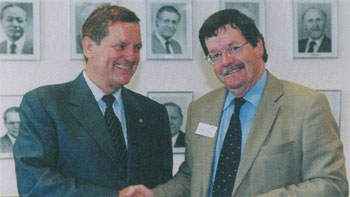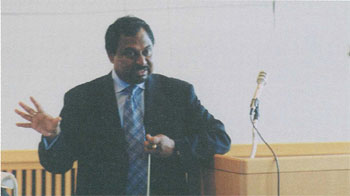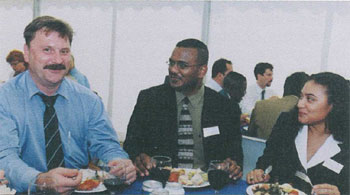|
International Maritime Information
International Maritime Organization (IMO)
Balmy breeze from the maritime world
This section will provide information on hot topics in the world maritime communities, especially on those from the floor of the International Maritime Organisation. The present issue features the 48th meeting of the Marine Environment Protection Committee (MEPC). It was held from Oct. 7 to 11, 2002 at the IMO headquarters under the chairmanship of Mr. Michel Julian (Australia). Eighty-five countries, one associate member and many organisations attended the meeting and discussed a lot of issues:
1. Ballast water treaty
Hoping to sign in autumn 2003, participants negotiated over the control of transfers of harmful organisms in ballast water. The discussion involved regulations such as ballast water treatment standards in each short and long term, ballast water exchange areas, survey and port state control. No consensus was reached on details, but an inter-sessional meeting of the ballast working group will take place in March 2003.
2. Ship recycling
To further reduce wastes and to achieve safer and ecological conditions in and around scrapping yards, MEPC is working on "IMO Guidelines on Ship Recycling." Incentive schemes, design concepts facilitating recycling and removing hazardous substances, and roles of stakeholders are at issue. An agreement will be finalised at the next session.
3. Greenhouse gas emission from ships
In cooperation with the UN Framework Convention on Climate Change (UNFCCC), MEPC is seeking a way to reduce emissions and to allocate emissions to Parties to the UNFCCC. The majority agreed to the following:
1) By 2005, MEPC will make guidelines on GHG index scheme and ask its members to implement voluntary measures making use of it;
2) By 2010, based on the result of the above trial, MEPC will consider adoption by IMO of further measures for the limitation or reduction of GHG emissions.
China and two other delegations insisted that only developed countries and economies in transition should pursue the GHG reduction following a provision of the Kyoto Protocol to UNFCCC.
4. Enforcement of MARPOL Annex IV (Pollution by sewage from ships)
It was reported that condition of entry into force of MARPOL Annex IV was met this Sept. and it will become effective from Sept. 27, 2003. Resolution MEPC. 88 (44) recommended Parties to the Annex IV to implement the revised Annex approved at the 44th session immediately after enforcement. Legal problems in the early implementation will be discussed at the next session.
5. Revision of Condition Assessment Scheme (CAS)
CAS was adopted in MEPC 46 and entered into force on Jul. 1, 2002. The revision, scheduled to be discussed in MEPC 48 to include annexes on the Model Survey Plan (MSP), was adopted in this session with some editorial modification.
6. Status of MARPOL Annex VI (Air Pollution from ships)
Annex VI was agreed to in 1997 and six countries (24.97% of world tonnage) had been ratified as of the end of September. Eleven countries including Cyprus, Greece, Panama stated that they are going to ratify the Annex VI by the first half of 2003, which would mean the Annex will become effective before mid 2004.
7. Revision of category system for noxious liquid substances (MARPOL Annex II)
Based on revision of the GESAMP Hazard Evaluation Procedure for Chemical Substances Carried by Ships in 2001, new category system for noxious liquid substances was discussed. Japan and some countries supported the new 5-category system for economic reasons, whereas the Netherlands and some countries supported the simpler 3-category system. A compromise could not be reached, and this issue will be taken up in the BLG8 and MEPC49.
8. Survey and Certification Guidelines under the anti-fouling system convention
"Guidelines for Survey and Certification of Anti-fouling Systems on Ships", one of three guidelines for the International Convention on the Control of Harmful Anti-fouling Systems on Ships, were agreed to and adopted as an MEPC resolution.
9. Election of the chairman for 2003 and dates for the next session
Mr. A. Chrysostomou (Cyprus) was elected chairman by secret ballot. MEPC 49 will be held from July 14 to 18, 2003, subject to approval by the Council.
Enhances academic profile
The World Maritime University is in the process of recruiting four new senior professors to expand and enhance its research profile. Three of these professorial Chairs will be funded by The Nippon Foundation of Japan, while one will be funded by the Canadian government. "This level of investment - almost half a million dollars per year - is indicative of the international community's support for WMU's research profile," said WMU Rector, Dr. Karl Laubstein, "We have invested a great deal of effort in the past two years in making our activities more visible, including starting to publish an academic journal, and we feel that this has now paid off."
On 26 August, WMU and the University of Wales Swansea signed a Memorandum of Agreement to launch a new joint postgraduate programme leading to a PhD in Maritime and International Commercial Law. This unique collaborative programme uses the internationally renowned research excellence of the University of Wales Swansea (UWS), in conjunction with WMU's specific maritime expertise to create a PhD programme of real relevance to the maritime industry of tomorrow.
 |
| Rector of MWU (left) and Professor Rhys Williams, Pro-Vice-Chancellor
for Academic Affairs at UWS (right) |
"WMU is delighted with this initiative, which will really allow students to benefit from the best of both institutions," said Dr. Laubstein. "Swansea's Department of Law is a recognised Centre of Excellence in the UK, and is well-known for its research in maritime law. When this is coupled with WMU's expertise across the range of maritime affairs, we feel that we can offer a very special research opportunity to talented students, and one that cannot be matched elsewhere."
The first intake to the joint PhD programme will be
in September 2003, and these students are expected to graduate in 2006. They will
spend time both in Swansea and in Malmö, and have access to the facilities
of both institutions at all times. Supervision will be provided by a staff member
from each university.
 |
| Professor P K Mukherjee, the Director of the symposium on Martime
Violence and Security Issues at Sea |
"We are also making excellent progress with the development of a doctorate based solely at WMU," said Dr Laubstein. "We plan to offer a professional degree - a Doctor of Maritime Affairs - along the lines of the Doctor of Business Administration degrees offered by leading business schools in the USA. We see this degree, alongside our Master's programme, the joint PhD programme and our wide-ranging research projects, as completing the WMU postgraduate portfolio."
The Memorandum of Agreement was signed on the first day of a different example of collaboration with UWS. The international symposium on Maritime Violence and Security Issues at Sea, held at WMU from August 26 to 30 was attended by 102 participants from 42 counties around the world. Organised jointly with the Department of Law at UWS, the symposium attracted generous contributions towards its costs from the Governments of Sweden, Germany and the United Kingdom. The symposium attracted a range of distinguished speakers from around the world, who presented papers on topics covering global issues of concern including piracy, the trafficking of illegal immigrants and terrorism.
 |
| At the Symposium Reception: Sasakawa Fellow Robertinas Tarasevicius,
Lithuania (left) |
|